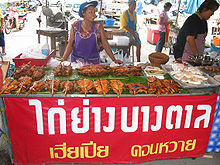This article includes a list of general references, but it lacks sufficient corresponding inline citations. (February 2013) |
Kai yang or gai yang (Thai: ไก่ย่าง, pronounced [kàj jâːŋ], lit. 'grilled chicken'), also known as kai ping or gai ping (Thai: ไก่ปิ้ง), or pīng kai (Lao: ປີ້ງໄກ່, [pîːŋ kāj]), is a Thai,Lao dish originating in Laos and Thailand, but it is now commonly eaten throughout the whole of Thailand.[1][2][3] The dish is a standard staple of street markets and readily available at all times. Some regions and become popular because of their flavorful and tender Ping Kai prepared using unique ingredients for marinating and techniques for grilling the meats.[4] Being a typical Laotian dish, it is often paired with green papaya salad and sticky rice (Thai/Isan: ข้าวเหนียว, pronounced [kʰâ(ː)w.nǐaw]; Lao: ເຂົ້າໜຽວ, pronounced [kʰȁ(ː)w.nǐaw]) or eaten with sticky rice in bamboo (khao lam in Lao). It is also eaten with raw vegetables, and often dipped in spicy sauces such as Laotian jaew bong.[1]
 Kai yang at the old market of Don Wai, Nakhon Pathom | |
| Region or state | Southeast Asia |
|---|---|
| Associated cuisine | Lao, Thai |


In Thailand, there are also many famous Thai Muslim varieties of kai yang which are not of Lao origin at all, but more akin to the grilled chicken from Malaysia.[citation needed]
Names
editThe Laotian name for the dish is pīng kai (ປີ້ງໄກ່) and means "roast chicken". In Laotian restaurants in the West, it is known as "Laotian barbecued chicken" or "ping gai". The Thai and Isaan term is usually spelled ไก่ย่าง (kai yang; Isan: [káj ɲāːŋ]), although ปิ้งไก่ (ping kai; Isan: [pîŋ káj]), a Thai letter rendering of the Laotian name, would be understood in Isan and in most of Thailand as well although to Thai ears it would sound a bit quaint, due to the slight grammatical difference between Thai and Laotian. Thais would put kai before ping rather than the other way round. In the West, where this dish often features on the menu of Thai restaurants, it is either known by its Thai name kai yang or as "Thai barbecued chicken".[2][3]
Ingredients and preparation
editA whole chicken is often halved and pounded flat. It is marinated and then grilled over a low heat on a charcoal flame for a long time, but is not cooked to be burnt or dry. The marinade typically includes fish sauce, garlic, turmeric, coriander root (cilantro), and white pepper. Many variations exist, and it is also quite common to find black soy sauce, hoisin sauce, shallots, leaves and seeds of coriander, lemongrass, chilis, ginger, vinegar, palm sugar, and MSG.[2][3][5]
See also
editReferences
edit- ^ a b "Traditional Lao Barbecue In Luang Prabang". 10 September 2023.
- ^ a b c "PING GAI (LAOTIAN GRILLED CHICKEN)". n.d.
- ^ a b c Vera Abit-bol (n.d.). "PING KAI".
- ^ "Savannakhet's Famous Xeno Grilled Chicken Now in Vientiane". 7 August 2016.
- ^ Fauzan Anandi-ka (9 January 2021). "Laos-Ping Kai".
- Tan, Terry. (2007). The Thai Table: A Celebration of Culinary Treasures. Marshall Cavendish. ISBN 981-261-442-7
- Brissenden, Rosemary. (2007). Southeast Asian food: Classic and Modern Dishes from Indonesia, Malaysia, Tuttle Publishing. ISBN 0-7946-0488-9
- McDermoot, Nancie. (1992). Real Thai: The Best of Thailand's Regional Cooking. Chronicle Books. ISBN 0-8118-0017-2